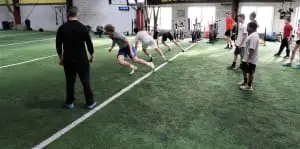As athletes, we have all been told that there is a certain drill or piece of equipment that will accomplish all our speed and agility dreams.
“Use the speed ladder to get faster feet”
“Sprint with a parachute to run faster”
“Perform long runs that make you tired”
“Sprint in the pool”
“This professional athlete does this, so do that”
There are numerous examples.
At Pratt Performance Systems (PPS), we are firm believers in speed and agility training. We love performing slower activity drills to reinforce proper technique when sprinting or making cuts in any direction. We follow that up by having competitive sprint and change and directions drills to maximize effort from each athlete when we decide to get after it.
We love making these drills more game-like by progressing the athletes to reactive starts and cuts vs. predictable ones. A 20-yard sprint or 60-yard shuttle can be beneficial if you are at the field by yourself. However, when you have the luxury of a coach and other athletes with similar goals, it’s time to make the drills become as game-like as possible.
A simple redirection cued by the coach pointing or an athlete chasing another athlete that is making multiple cuts in a ten-second time frame can make a speed drill exponentially more effective.
However, the drill selection still might not be the lowest-hanging fruit in improving speed or jumping higher for some athletes.
So what is?
BODY FAT.
Losing body fat can be the easiest trick in the book to getting significantly faster. Here at PPS, we have noticed multiple times that the common denominator in many of our athletes that have had significant speed improvements are the ones that have lost noticeable amounts of body fat.
Speed and strength are mandatory qualities to train year-round to improve athleticism. However, a change in nutrition habits may be the next game changer for you. If getting faster and quicker are your primary goals, ditch the speed ladder and start consuming more lean protein and vegetables instead of pizza and chips.
See a nutritionist. This could be an incredibly worthy investment for a young athlete. Learning the ins and outs of how to eat better to maximize their athleticism could give them a huge advantage on the field or court.
Have questions? Reach back out to us, we’d love to help and take the conversation further.
James Pratt

